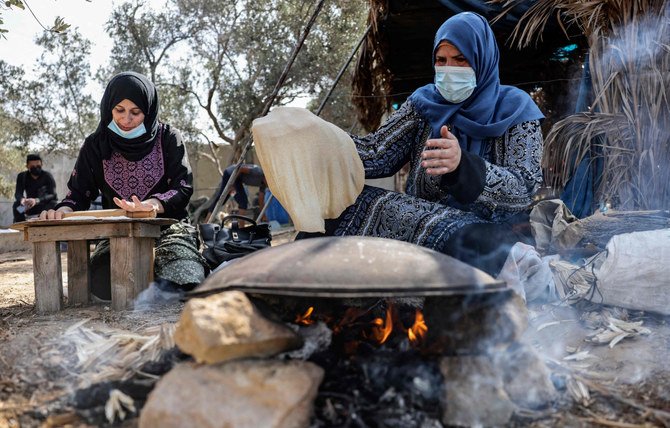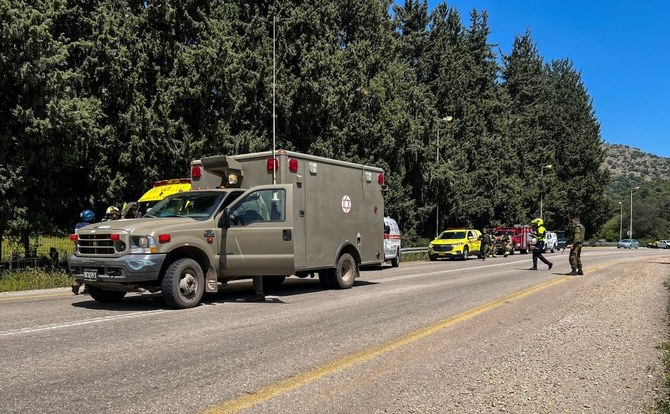GAZA CITY: Mahmoud al-Dakhni was one of the thousands of Palestinians gathered in front of the Chambers of Commerce headquarters in Gaza to apply for work permits inside Israel.
They were of different age groups and backgrounds, including degree holders, and crowded outside the building in the hope of obtaining Israeli approval to apply for a permit that would allow them to pass through the Erez crossing and escape Gaza’s deteriorating economic reality.
Since Hamas seized control of Gaza by force in 2007, Israel has imposed a siege that has caused Palestinians’ economic conditions to suffer.
The situation worsened due to Israeli restrictions since the last war in May 2020.
Al-Dakhni said he had worked for a few days not exceeding the number of “fingers of the hand” since that war.
“Working in Israel is more profitable than in Gaza where the worker gets ILS300 ($93.12) or more, while the wages of a worker in Gaza do not exceed ILS50 per day, and with longer and more miserable working hours,” said the 33-year-old construction worker, who has six children.
To obtain a work permit Al-Dakhni, like others, resorted to opening a commercial registration with the Chamber of Commerce to prove he was a merchant, which is a condition for obtaining Israeli approval.
Al-Dakhni borrowed the amount he had paid for the commercial register. “Everyone does this,” he explained. “Israel does not announce that these are work permits, but rather permits for merchants, but the truth is that those who obtain them use them to work in Israel.”
Mahmoud Haniyeh and four of his friends resorted to the same approach, obtaining a commercial registration after sharing its costs. “We each paid ILS1,700 and we hope to compensate for it by working in Israel.”
Haniyeh, 45, used to work as a tailor in the Erez industrial zone, before losing his job completely with the Hamas takeover of Gaza.
Haniyeh, who supports a family of eight, said he had to buy a car in instalments to work as a taxi driver to provide for his family’s needs. But it became a burden on him due to the poor economic conditions of the majority of the population.
“I work on the car every day from six in the morning until the evening hours, and on many days what I get does not meet the basic needs of the family … We only want our children to live a decent life.”
Video clips of work permit seekers circulated on social media. They directed their anger at Fatah and Hamas and held them responsible for the crises afflicting Gaza.
One clip showed a man, who appeared to be in his late thirties, saying he graduated from university in 2009 while his wife had graduated this year and that they had no hope of getting a job.
“University degrees have become useless in light of the division, especially if you are not affiliated with a political faction,” he said in the clip.
Egypt is currently working to consolidate the truce that it sponsored between Hamas and Israel that halted the 11-day war last May. But the Egyptian mediation has not yet resulted in bringing the two sides closer together.
Israeli public radio said the total number of permits granted to Palestinian workers from Gaza to work inside Israel was 7,000, after their number was about 5,000 workers and traders last August.
In 2019, Israel allowed Gaza residents to submit job applications for the first time, with the number of workers in Israel from Gaza standing about 120,000 before the second Intifada in 2000.
At the time, the labor of these workers contributed to about 20 percent of the Palestinian economy in Gaza, according to local data.
The Chamber of Commerce said it received about 10,447 applications — in one day — to obtain work permits in Israel and the West Bank.
The Ministry of Labor in Gaza held the “responsibility for the accumulation of unemployment in Gaza, which has reached unprecedented numbers, due to the continuation of the siege imposed for the 15th year in a row, and the policy of closing the crossings.”
Permit applicants must meet several criteria. They must be aged between 26-60, married, unemployed, and vaccinated against COVID-19.
More than 2 million people in Gaza suffer from poor economic conditions resulting from an Israeli blockade since 2006, which has caused a rise in poverty and unemployment rates.
According to a report from the Palestinian Central Bureau of Statistics last August, the number of unemployed people in the Gaza Strip had reached 212,000, with an unemployment rate of 45 percent.
The head of the Gaza Labor Union, Sami Al-Amsi, said Israel had not yet allowed Gaza workers to work inside Israel and that all the permits issued were for merchants.
Al-Amsi believed that Israel’s issue of permits to merchants, and not as part of worker permits, did not obligate employers in Israel to show rights toward these workers.






















